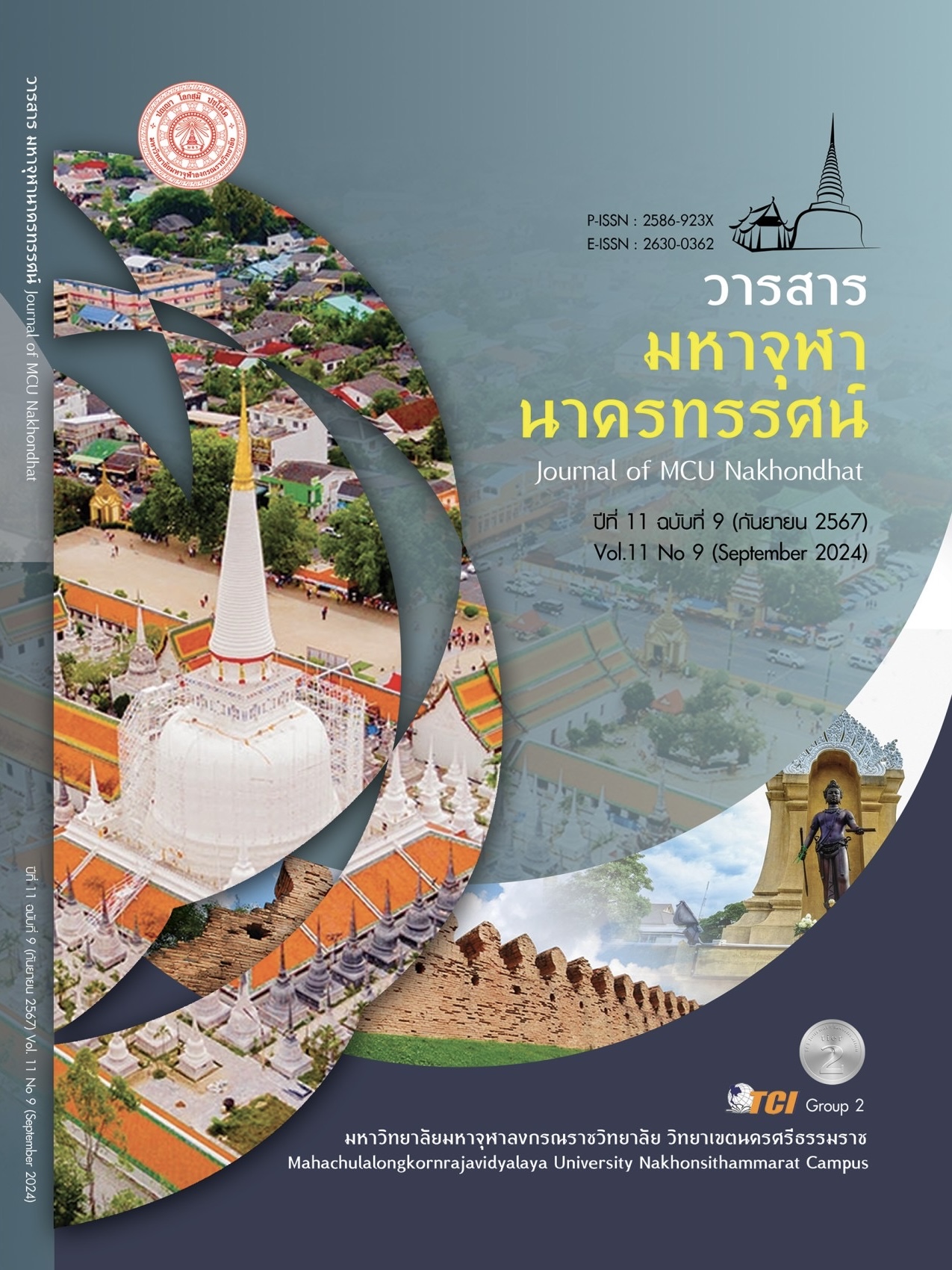AN APPLICATION OF THE FOUR BRAHMAVIHARA PRINCIPLE TO DEVELOPMENT BAN NONG BO COMMUNITY, KHOK SAI SUBDISTRICT, PA BON DISTRICT, PHATTHALUNG PROVINCE
Main Article Content
Abstract
The objectives of this research paper are to 1) Study the concept of community development, 2) Study the 4 principles of Brahma Vihara as they appear in the Theravada Buddhist scriptures, and 3) Apply the 4 principles of Brahmavihara in the development of Ban Nong Bo community, Khok Sai sub-district. Pa Bon district. Phatthalung province. As a qualitative research. The researcher surveyed and collected data by in-depth interviews. Synthesize the results and present them in the form of descriptive narratives. The results of the study showed that: 1) Community development is the change of the community for the better or more prosperous. To create progress for both the people and the community. 2) Creating knowledge, morality, and responsibility to the public for further progress and development. Brahmavihara 4 is the category of Dharma that is the dwelling of adults in a noble way, it is the principle of the heart, and it is the principle for all people: Compassion affection, wishing for them to be happy, Loving-kindness, compassion, thinking to help them get rid of suffering, sympathetic joy and equanimity. When others are good, indifferent. 3) The application of the 4 principles of Brahmavihara in the development of Ban Nong Bo community, Khok Sai sub-district, Pa Bon district, Phatthalung province to problems of economic, conflicts and solving the problem of lack of generosity. Giving with kindness does not expect anything in return. Sacrifice to free him from suffering. Generosity with sincerity and the maintenance of the Dharma. In addition to helping to bring happiness in physical and mental aspects, it also promotes the development of the community into a strong community and peaceful coexistence in the community.
Article Details

This work is licensed under a Creative Commons Attribution-NonCommercial-NoDerivatives 4.0 International License.
References
กิตติทัศน์ ผกาทอง. (2551). ภาวะผู้นําตามแนวพุทธ. กรุงเทพมหานคร: โรงพิมพ์มหาจุฬาลงกรณราชวิทยาลัย.
แก้ว ชิดตะขบ. (2548). รวมวิชาธรรมศึกษาชั้นตรี ตามหลักสูตรของสนามหลวงแผนกธรรม พ.ศ. 2546. กรุงเทพมหานคร: โรงพิมพ์การศาสนา.
ณรงค์ ศรีสวัสดิ. (2542). สังคมวิทยาชนบท. กรุงเทพมหานคร: คณะสังคมศาสตร์ มหาวิทยาลัยเกษตรศาสตร์.
ดนัย ไชยโยธา. (2544). พจนานุกรมพุทธศาสตร์. กรุงเทพมหานคร: สำนักพิมพ์โอเอส พริ้นติ้งเฮาส์.
พระกิตติราช จารุวณฺโณ (เนตรแสงสี). (2559). “การศึกษาการบริหารโรงเรียนตามหลักพรหมวิหาร 4 ของผู้บริหารโรงเรียนประถมศึกษา ในเขตหนองแขม สังกัดกรุงเทพมหานคร”. ใน วิทยานิพนธ์พุทธศาสตรมหาบัณฑิต สาขาวิชาการบริหารการศึกษา. มหาวิทยาลัยมหาจุฬาลงกรณราชวิทยาลัย.
พระครูวิวัฒน์ธรรมานุกูล ธมฺมปาโล (อ๊อด). (2559). “ความคิดเห็นของครูที่มีต่อผู้บริหารสถานศึกษาตาม หลักพรหมวิหาร 4 ของโรงเรียนประถมศึกษา เขตสายไหม สังกัดกรุงเทพมหานคร”. ใน วิทยานิพนธ์พุทธศาสตรมหาบัณฑิต สาขาวิชาการบริหารการศึกษา. มหาวิทยาลัยมหาจุฬาลงกรณราชวิทยาลัย.
พระคําพูน ขนฺติปญฺโญ (สิทธิชัย). (2558). “การใช้หลักธรรมพรหมวิหาร 4 ในการบริหารบุคลากรโรงเรียน ประถมศึกษา เขตธนบุรีกรุงเทพมหานคร”. ใน วิทยานิพนธ์พุทธศาสตรมหาบัณฑิต สาขาวิชาการบริหารการศึกษา. มหาวิทยาลัยมหาจุฬาลงกรณราชวิทยาลัย.
พระอดิศักดิ์สารโท (เตือนสันเทียะ). (2557). “การบริหารงานบุคคลตามหลักพรหมวิหาร 4 โรงเรียน ประถมศึกษาอำเภอวังน้อย จังหวัดพระนครศรีอยุธยา”. ใน วิทยานิพนธ์พุทธศาสตรมหาบัณฑิต สาขาวิชาการบริหารการศึกษา. มหาวิทยาลัยมหาจุฬาลงกรณราชวิทยาลัย.
พัฒน์ บุณยรัตนพันธ์. (2517). การสร้างพลังชุมชนโดยขบวนการพัฒนาชุมชน. กรุงเทพมหานคร: วัฒนาพานิช.
มหาจุฬาลงกรณราชวิทยาลัย. (2539). พระไตรปิฎกภาษาไทยฉบับมหาจุฬาลงกรณราชวิทยาลัย. กรุงเทพมหานคร: มหาจุฬาลงกรณราชวิทยาลัย.


